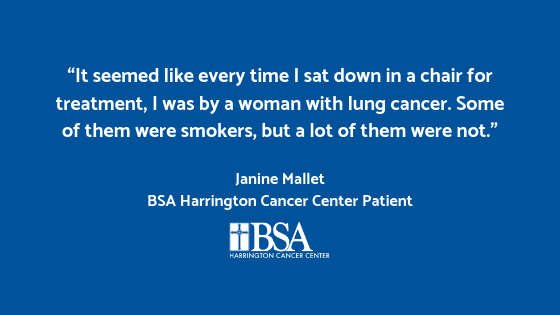Lung Cancer Survivor is Thankful to be Cancer-Free
What began as chest cold symptoms, quickly turned into a diagnosis of lung cancer for Janine Mallet. Mallet, while on vacation with her husband in September of 2018, experienced severe wheezing and coughing which led her to seek treatment after returning home.
Mallett visited BSA Urgent Care Center thinking she needed an antibiotic. The physician requested that she have a chest X-Ray done.
“The first thing the doctor asked was if I had a history of lung cancer in my family,” Mallet shared. “Two family members died of cancer but they had been heavy smokers. I’ve never smoked in my life.”
BSA Urgent Care Center immediately sent Mallett to BSA Hospital for a computed tomography scan (CT scan).
Following her CT scan, Mallett met with Dr. Javier Dieguez, a pulmonologist with BSA Amarillo Diagnostic Clinic. Images reflected cancer scattered across her chest, with tumors along the chest wall and cancerous lesions on the outside rim of her right lung.
In the following days, a biopsy and more tests confirmed Mallett had 3B Lung Adenocarcinoma.
“I didn’t believe it at first,” Mallett said. “I always related lung cancer with smoking, and I had never smoked.”
Mallett went to BSA Harrington Cancer Center to meet with Dr. Daniel Arsenault and Dr. Anita Rivapati about treatment options.
“The confidence both doctors gave me made me feel confident,” Mallet shared. “I felt they were supportive of whatever I decided to do.”
On November 12, 2018, Mallett started a rigorous treatment plan: 33 days of radiation and two rounds of chemotherapy.
The staff and atmosphere at BSA Harrington Cancer Center gave Mallett the strength and support she needed during this challenging time.
“The nurses were so attentive, caring and accommodating,” Mallet said. “You feel God all around you at BSA Harrington Cancer Center.”
Mallett finished treatments on January 3, 2019. On April 10, 2019, Mallett received news that would change her life forever. Mallett was officially cancer-free.
“I started crying,” Mallet shared. “Dr. Arsenault told me there was no cancer left, just scar tissue. It was a glorious day realizing I was now cancer-free.”
Mallett feels her body getting stronger every day, and is looking forward to leading an active lifestyle with her husband.
“It’s been a steep hill that I’m slowly climbing out of,” Mallet explained. “I have good and bad days, and my body is getting stronger. I go to the gym and walk a little over a mile each day.”
“At Harrington, I learned that lung cancer is the leading cancer for women in my category and second leading cancer of women,” Mallet shared. “It seemed like every time I sat down in a chair for treatment, I was by a woman with lung cancer. Some of them were smokers, but a lot of them were not.”
Overall, the chance that a woman will develop lung cancer in her lifetime is about 1 in 17. Lung cancer is considered deadly because it is not always detected in its early stages. Symptoms may not be present until the cancer spreads to other parts of the body.
Mallett encourages women to feel empowered to ask about lung exams during annual exams, as well as seek medical care if something feels off. Discuss your lung cancer risk with your doctor. Click here to find a physician.


